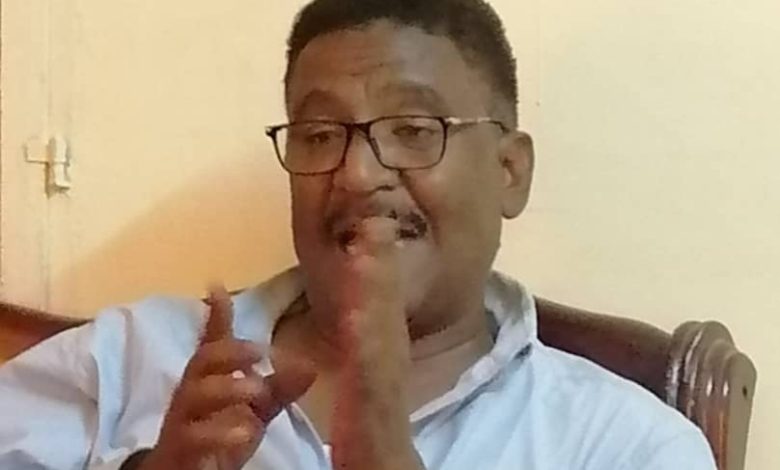“Legitimacy in Your Eyes”…!!!

By Haidar Al-Tom, Lawyer
The most prominent headline from the meetings of the leadership of the Taqaddum coordination is that “they have plans to strip the current government of its legitimacy” or, as Hamdok said.
By implication, this suggests that the current government enjoys some degree of legitimacy, which Taqaddum seeks to undermine.
This scene—attempting to delegitimize any sitting government—is a typical feature of Sudanese political practice in “normal” times.
Even parliamentary governments, albeit rare in Sudan’s history, were subjected to attempts at delegitimization by their political rivals.
This implies that Taqaddum, like any political opposition, seeks to delegitimize the government to replace it and implement its own programs. But does Taqaddum have the legitimacy and authority to serve as an opposition? (The matter isn’t as simple as it seems).
In parliamentary governments, opposition forces with legitimate standing could confront the government by withdrawing confidence, opposing it in parliament, blocking government programs, and mobilizing their bases in the streets until the government fell. These were the traditional methods of delegitimization.
So, what mechanisms will Hamdok employ?
Certainly, those mechanisms will not include reliance on the UAE or the international community. (That’s a sea they’ve tried to swim in and ended up floundering in). Nor will they likely involve public demonstrations, as this requires popular support, which Taqaddum lacks. Or maybe their methods will include causing shortages of sugar, flour, and essential supplies—creating crises for the government, as was done in the past. Such tactics are redundant in a country already plagued by war—a war that is the “mother of all crises.”
Regarding the ongoing war, which Hamdok ignores, it’s worth noting that any war exhausts the people—ordinary people—making their primary concern the cessation of the conflict and the restoration of lost security and safety.
Consequently, discussions of dreams and aspirations for civilian governance and freedoms are put on hold. Societies worn down by war focus on survival or resisting aggression, delaying societal debates—the cornerstone of societal progress. Such discussions don’t occur in foreign locations like Entebbe or elsewhere (if that’s even how it’s pronounced—I’m not sure, nor does it matter to most Sudanese people).
What is legitimacy?
More importantly, what legitimacy or authority does Hamdok and his group have to act as the “police” of legitimacy? Sudan’s experience shows that political rivals fight over legitimacy in parliament, with both sides possessing the necessary legitimacy and authority to engage in such struggles. So, we must ask: what is Hamdok’s legitimacy in Taqaddum?
Legitimacy, without delving into complex legal terms, in political science means “the right and acceptance of authority.” It implies that a ruler holds authority through either a legal right or popular will—commonly expressed as “revolutionary legitimacy.”
If we assume that Hamdok and his group still act based on revolutionary legitimacy (an assumption lacking evidence and logic), then Burhan and his government also have a share of that legitimacy. Moreover, they possess an additional justification: the acceptance and support enjoyed by the Sudanese army and its commander-in-chief, who is also the head of Sudan’s Sovereign Council.
This simplified definition of legitimacy isn’t my invention; it’s drawn from the British liberal philosopher John Locke, who stated: “Political legitimacy derives from the explicit and implicit consent of the governed.” Hamdok, being a liberal, would not object to such a definition. Similarly, the American sociologist Seymour Martin previously noted that legitimacy is “maintaining the belief that the existing political institutions are the most suitable for society.”
Thus, Hamdok is correct to assert that the Sudanese government has a degree of legitimacy. However, neither he nor his group can convince Sudanese people that they are more suitable than Burhan. Their inability to do so is rooted in their disgraceful stances towards the Sudanese people—a stark truth.
On suitability
Who knows what Hamdok and Taqaddum would do if they were in Burhan’s position? Perhaps they would reinstate Hemedti (“the alpha male”) to dismantle the state established in 1956. Or they might strike a deal with him: “You get the flesh, we’ll keep the bones,” tasking him with disciplining the Sudanese people (the remnants, the Islamists, etc.) “because they didn’t listen to us,” as one Taqaddum leader suggested. Or maybe they’d justify atrocities by claiming, “The Janjaweed came from the womb of the armed forces,” revealing a logic that collapses under scrutiny.
And who knows what else might occur if Hamdok and his ilk were deemed more suitable for governance during these times. These are people who have failed to support the nation but instead compounded our suffering by inviting foreign hostility against their own people. They are utterly unsuitable, and in reality, we can expect anything from them.
The essential demand
However, all of this remains mere rhetoric. Legitimacy is not our current demand. The Sudanese people’s demand is for Sudan itself. Only then can discussions of legitimacy and propriety follow.
But who will tell these politicians in Taqaddum that we are facing a war aimed at destroying the people and their resources?
A war characterized by ethnic cleansing, genocide, senseless killing, merciless displacement, and the replacement of our people with others. A war the entire world acknowledges as targeting the population, using rape as a weapon and looting as a means to force people from their homes and lands—a war rife with all imaginable and unimaginable horrors.
A war fueled by foreign involvement, with funding, weapons, and mercenaries.
In the midst of this, Hamdok appears like a crying child (with his short arms, teary eyes, and incoherent speech) to lecture us about legitimacy!
“Legitimacy in your eyes!”



